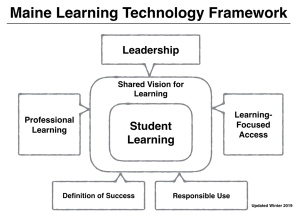 The Maine Learning Technology Framework describes the key elements and components needed to achieve the greatest learning benefit from a district’s technology investment. The Framework is intended to support teachers, tech leads, librarians and other school leaders in their efforts to leverage technology to improve student learning experiences related to learning targets and outcomes.
The Maine Learning Technology Framework describes the key elements and components needed to achieve the greatest learning benefit from a district’s technology investment. The Framework is intended to support teachers, tech leads, librarians and other school leaders in their efforts to leverage technology to improve student learning experiences related to learning targets and outcomes.
At the center of the Framework is a focus on creating good learning experiences for students, recognizing that the quality of the pedagogy and learning experiences drive student learning and achievement. The core of the Framework are student learning experiences and a district’s Shared Vision for Learning.
Student Learning – Many 1to1 technology initaitves leverage a common model to guide teacher practice and the integration of technology into instruction and learning: Technological, Pedagogical, Content Knowledge (TPCK) by Drs. Punya Mishra and Matthew Koehler. TPCK suggests that technology serves education best at the intersection of content knowledge and pedagogy and instruction.
Using TPCK terminology, this portion of the Framework focuses on the following instructional practices (from the Plain English Instrucitonal Model), and thinking about how technology can support these practices:
- Instruction for Foundational Knowledge: Helping students learn the basics in subject area content.
- Instruction for Practice and Deepening Understanding: Helping students develop some fluency and automaticity with those basics, or develop conceptual understanding beyond simple memorization.
- Instruction for Using Knowledge: Students demonstrating their proficiency with content and skills by applying them in a real world context and at a higher level of complex reasoning.
- Assessment, Feedback & Continuous Improvement: Providing timely feedback to drive continuous improvement, or capturing evidence of what they know and can do.
- Student Motivation & Engagement: Ensuring that students are mentally and physically present and engaged. Educators creating the conditions for student self-motivation.
Shared Vision for Learning – An school’s Shared Vision for Learning is a powerful tool to help describe what kinds of learning experiences the school’s educators, parents, students, and community value and want to see in their schools. Note: this is not intended to be a vision for technology, nor a general vision for school. Where the Vision should focus on desired learning experiences or conditions for learning, technology should be considered one collection of tools applied to help advance classroom practice toward that Vision.
Student learning, the core of the Framework, is supported and undergirded by five pillars:
- Leadership – Achieving the Vision for Learning takes a diverse team of school leaders who can both help build buy-in for the Vision and for the role of technology within the Vision, but also to help manage the implementation of the development, adjustments, and alignment required of the Vision.
- Professional Learning – The strategies used by the district to provide timely professional learning opportunities, and other supports designed to effectively encourage and assist teachers’ successfully bolstering and broadening classroom practices.
- Learning-Focused Access – Each learner (adult and child) has access to the device, connectivity, apps, programs and services they need, as they need them for their learning, with a minimum of barriers to engaging in purposefully designed learning experiences.
- Definition of Success – How the district defines success for applying technology to learning, how they ensure that definition is broadly known and understood, and how they measure progress against clear goals.
- Responsible Use – How the district ensures they are meeting CIPA requirements. How they are applying their technology to improving accessibility for students. The approaches and strategies they are using to help students learn to use technology responsibly and safely.
The Maine Learning Technology Framework was originally created for the Maine Department of Education to support MLTI (the Maine Learning Technology Initiative) and other learning through technology efforts across the state.